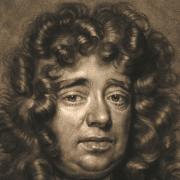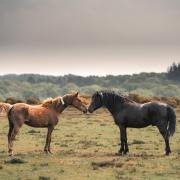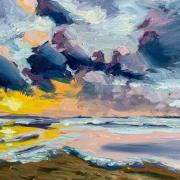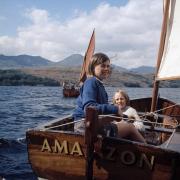Born in Portsmouth on April 13, 1949, to parents of humble origin, Christopher was the elder brother of Mail on Sunday columnist, author, broadcaster and journalist Peter Hitchens (1951-). The Hitchens family was certainly imbued with the journalistic gene. Their parents were Eric Hitchens (1909-87) and Yvonne née Hickman (1921-73), who’d met in Scotland whilst serving during WW2. Eric was aboard HMS Jamaica, which had been present at the sinking of the German battleship Scharnhorst in December 1943, whilst Yvonne was a member of the Women’s Royal Naval Service (WRNS). Christopher clearly felt fond of Portsmouth as he was pretty complimentary about it saying: ‘Portsmouth…is one of the world’s most astonishing natural harbours, rivalling even Valetta in the way that it commands the Channel approaches to the Atlantic and the North Sea’. That reference to Malta is unsurprising as his father’s naval career caused the family to lead a peripatetic lifestyle, staying in different bases, including in Malta where his brother Peter was born. His politics were already leftist when still at school, organising the Labour campaign during a mock election and joining a CND (Campaign for Nuclear Disarmament) march from Aldermaston. There were also some mock or maybe genuine pretensions; he was always Christopher, not Chris, his mother not wanting him mistaken for a ‘pot-hole filler’. He was fine with Hitch though, which most of his friends used and would be the title of his memoir to come.

Hitchens attended Balliol College, Oxford from 1967, graduating in 1970 with a degree in Philosophy, Politics and Economics, and appearing on University Challenge along the way. It was during the 1960s that Hitchens gravitated to the political left, antagonised, and motivated by traumas such as the Vietnam War, the debate over nuclear weapons, and adopting a counter-capitalist stance in the face of big business and monolithic corporations. He’d actually join the Labour Party in 1965 but was expelled two years later, which Hitchens reckoned was to do with his opposition to what was going on in Vietnam. He was out of line and would pretty much remain that way. After university Hitchens moved to London and began writing for the Times Higher Education Supplement. Tragically, his mother took her own life in November 1973, an event that must have affected him for the rest of his days, as he’d always been closer to her than his father. In the same year he became a staff writer with the leftist New Statesman before moving to the Evening Standard. He'd serve as foreign correspondent with the Daily Express (1977-79), then foreign editor at the New Statesman (1979-81).
Hitchens married in 1981 to Greek Cypriot human rights lawyer Eleni Meleagrou (until their divorce in 1989) and again in 1991 to American screenwriter Carol Blue for his final 20 years. He was to have three children, two by Eleni, and the youngest with Carol, Antonia Hitchens, who has followed her father by becoming an author, journalist and educator. Christopher’s nephew, Dan Hitchens, is another journalist and editor. Hitchens emigrated to the US in the early-1980s, moving to New York then Washington D.C. and writing for the liberal mag The Nation, plus Slate and Vanity Fair (from 1992). It’s fair to say his views would often be controversial, sometimes seemingly contradictory, but certainly never dull. What he never lost was his distaste for tyranny, of whatever persuasion it might be, and his commitment to civil liberties. He’d become one of the most talked about, divisive voices in contemporary American media, a marmite columnist whose views were probably loved and loathed in equal measure depending on whether the reader was left or right of centre. He was oft dubbed a contrarian, which seems fair enough; he was undoubtedly one of the left’s biggest journalistic stars, full of verve and wit, a polemicist of the Premier League.

One of his columns, a prescient one considering current controversy, was The Elgin Marbles: Should They Be returned to Greece? (1987). Hitchens wasn’t afraid to stick his neck out and following the extreme fallout from Salman Rushdie’s The Satanic Verses (1988) was happy to publicly defend his friend’s right to freedom of expression; the easy option would have been to keep quiet. A defender of some, he was an enemy to others, lambasting the likes of Mother Teresa, Bill Clinton and Henry Kissinger as he showed a healthy disregard for reputation and reverence.
Dubbed ‘the finest orator of our time’ by fellow non-believer and author Richard Dawkins, Hitchens was undoubtedly influenced by him, alongside other authors including Oxford-born Martin Amis and the American Daniel Dennett. Hitchens himself would be granted American citizenship in 2007, whilst retaining his UK citizenship. It was the same year that God Is Not Great: How Religion Poisons Everything was published. It was a title that was unlikely to win him friends among anyone of a religious persuasion. It was in this controversial work that his Hitchens’ Razor was first expounded, in which he exclaimed: ‘What can be asserted without evidence can also be dismissed without evidence’. Although Hitchens used the phrase specifically in the context of refuting religious belief, it has come to have a wider application including in philosophy and the law, a handy reminder that ‘the burden of proof regarding the truthfulness of a claim lies with the one who makes the claim’. It’s not a quantum leap from here to the age-old mantra that we should all be innocent until proven guilty. Hitchens’ memoir, Hitch 22, the title a parody of Catch 22, was published in 2010.
Christopher Hitchens died ten days before Christmas, on December 15, 2011, in Houston, Texas. He was aged 62. When confronted with the reality of cancer, he remarked on the possibility of an afterlife: ‘No evidence or argument has yet been presented which would change my mind. But I like surprises.’ Hitchens always considered what he did, reading, writing and public speaking, not as a job or career but simply a statement of who he was and what he loved.

CHRONOLOGY
1949 – Christopher Eric Hitchens born in Portsmouth (April 13).
1967 – Expelled from the Labour Party apparently over his views on the Vietnam War.
1970 – Graduates from Balliol, Oxford, with a degree in Philosophy, Politics & Economics.
1981 – Marries for the first time to human rights lawyer Eleni Meleagrou (until 1989).
1987 – Questions whether or not the Elgin Marbles should be returned to Greece.
1991 – Second marriage to American screenwriter Carol Blue.
2007 – Granted US citizenship; he’d moved to the United States in the early 1980s.
2010 – Publication of Hitchens’ memoir Hitch 22.
2011 – Death of Christopher Hitchens in Houston, Texas (December 15) aged 62.



























